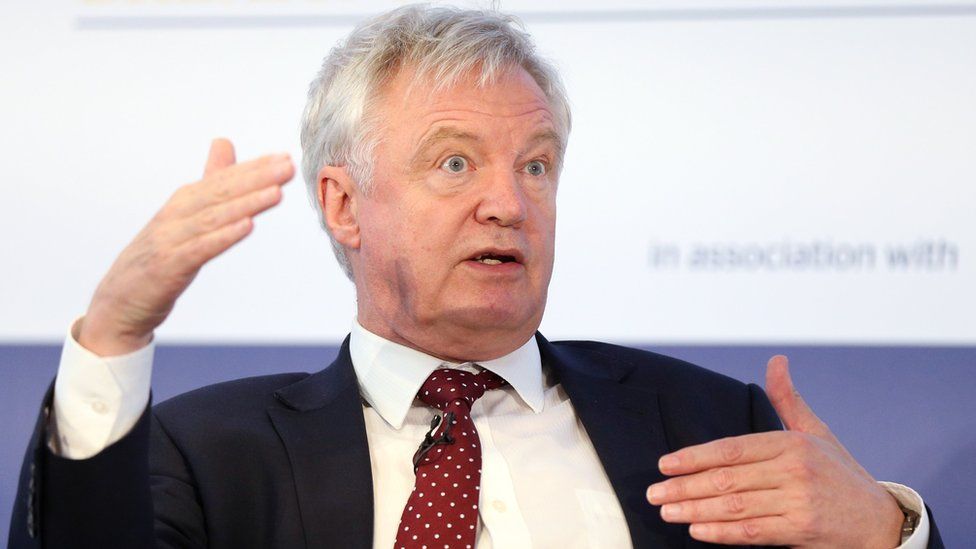David Davis: Brexit 'as complicated as moon landing'
- Published
- comments

The minister in charge of the UK's exit from the EU says elements of his job make landing on the moon look simple.
Brexit Secretary David Davis made the remark to business leaders as he discussed the interim arrangements that will be in place after the UK leaves.
He suggested the UK would no longer be in the EU's customs union and single market during this period.
And he said a "new international body" - not the European Court of Justice - would monitor new trade arrangements.
The UK is due to leave the European Union in March 2019.
Official negotiations began last week, and the UK is committed to leaving both the EU single market and its customs union.
The government has promised a "phased process of implementation" - or "transition period" - to avoid a "cliff-edge" scenario as new arrangements kick in.
Mr Davis was asked how this would work at an event for business leaders hosted by The Times.
Migration controls
Asked whether the UK would be out of the customs union in March 2019 - and therefore able to strike its own international trade deals - he replied: "I would have thought so."
He was also asked whether the UK would remain in the EU single market during the transition phase.
"No, no" he replied, adding that the government had taken "as written" the public's desire to control immigration, which could not be done as a single market member.
Ministers 'emboldened'
BBC political correspondent Chris Mason
We are witnessing an emboldened cabinet, unshackled from an obligation to be quite as publicly loyal as they once were to either their leader, or each other.
So just today, the Chancellor Philip Hammond began a scripted speech in Berlin with a pop at the Foreign Secretary Boris Johnson.
And the Brexit Secretary David Davis suggested Mr Hammond's views on the length of any transition period after Brexit were "not quite consistent with one another."
Ouch.
And then the prime minister's official spokesman intervened to insist Mr Davis and Mr Hammond's views on Brexit were consistent with each other, and with hers.
It all amounts to the flavour of Brexit being advocated: what happens to the economy? What happens to immigration? How freely, and in which sectors, will the UK be able to strike trade deals around the world?
Enter then a tangled web of confusing language to describe a vast array of potential outcomes: and welcome to the politics of the next few years at least.
The pro-EU Open Britain campaign group said it was "truly concerning" that Mr Davis seemed to have ruled out staying in the customs union and single market during the transitional phase.
Chancellor Philip Hammond, who was also making a speech on Tuesday afternoon, said the transitional phase should protect the "free flow of trade".
Moon shot
Mr Davis, who said the timescale for any transition period was likely to end in 2022, said preparing for Brexit involved "loads of preparation for various outcomes".
"Half of my task is running a set of projects that make the Nasa moon shot look quite simple," he said.
The UK is seeking a new free trade deal with the EU to replace the current arrangements - but talks on this cannot begin until the EU is happy with the progress made in the initial "divorce" stage.
How the new trade deal will be policed is likely to be a sticking point in the negotiations, with the UK vowing to leave the jurisdiction of the European Court of Justice.
Philip Hammond on Today backs a post-Brexit transitional arrangement
Mr Davis said the UK's trade with the EU would be monitored by a "new dispute resolution mechanism".
He did not give any details about what this new mechanism would look like, or where it would be based, beyond saying it would be an international body and not the European Court of Justice.
He also sought to reassure his audience that new arrangements for EU nationals would impose "practically no burden" on businesses, and that the government's approach to Brexit "puts jobs and prosperity first".
He added: "My job is to bring back control of migration to Westminster.
"It is not to slam the door on immigration. We will bring immigration down but in a way and at a pace that does not cause labour shortages or, worse, undermine the nation's need for new talent."
While Mr Davis was speaking, Mr Hammond was addressing Conservative economists and business leaders in Berlin.
He said the transitional phase would have to be one that "protects the free-flow of trade across our borders and the integrity of pan-European supply chains".
The chancellor said "petty politics" should not interfere with "economic logic" in the Brexit process and called for transitional arrangements to avoid a cliff-edge scenario.
"Early agreement on these transitional arrangements so that trade between our countries can carry on flowing smoothly will reduce uncertainty, unlock investment decisions, instil business confidence and protect jobs and prosperity, in Britain, in Germany and across this continent," he said.